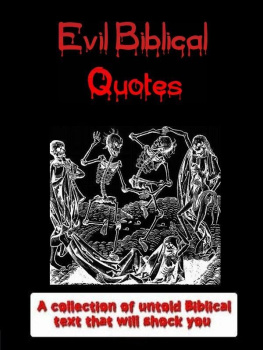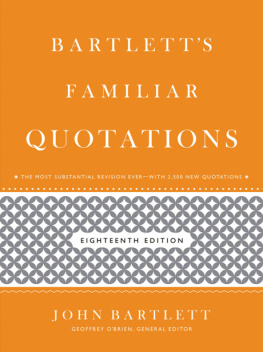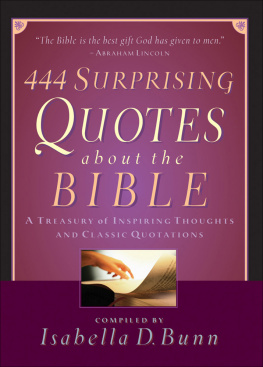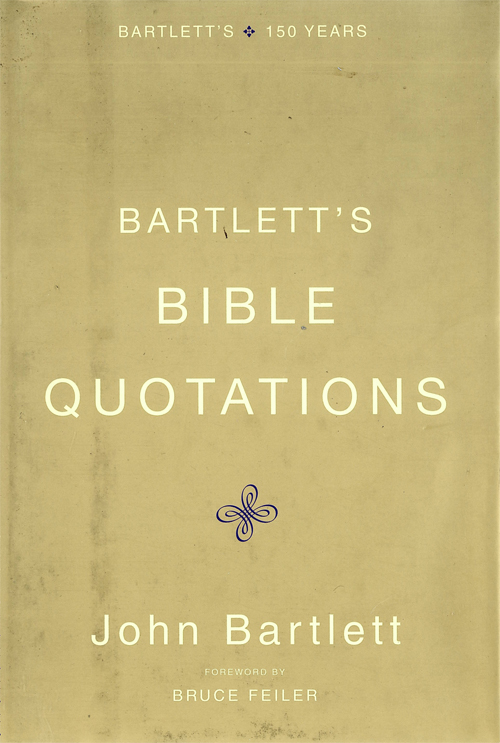Copyright 2005 by Little, Brown and Company
Foreword copyright 2005 by Bruce Feiler
All rights reserved. No part of this book may be reproduced in any form or by any electronic or mechanical means, including information storage and retrieval systems, without permission in writing from the publisher, except by a reviewer who may quote brief passages in a review.
Little, Brown and Company
Hachette Book Group
237 Park Avenue
New York, NY 10017
Visit our website at www.HachetteBookGroup.com
www.twitter.com/littlebrown
First eBook Edition: October 2009
The quotations in this book are from Bartletts Familiar Quotations, Seventeenth Edition, Justin Kaplan, General Editor
ISBN: 978-0-316-08667-7

The Bible has remained at the forefront of human thought and literature for thousands of years. Its stones are cherished around the world and are looked to for inspiration, research, and pure pleasure. Now Bartletts, the most respected source for quotations, presents an elegant volume celebrating the Bibles enormous influence on our language, culture, and life.
Organized simply from Genesis to Revelation and including Psalms, Proverbs, and the Apocrypha, Bartletts Bible Quotations comprises verse from the authoritative King James Version. Lovers of language can savor familiar phrases from the Old and New Testaments (God forbid, the skin of my teeth) and revel in the Bibles graceful poetry (Oh that I had wings like a dove!). The quotes selected advise (Pride is hateful before God and man), educate (A faithful friend is the medicine of life), inspire (The truth shall make you free), and provide source material for both literary detection and special occasions.
Ideal for the student or scholar and a perfect gift for those seeking inspiration and spiritual sustenance, this gorgeous collection highlights the timeless wisdom and enduring glory of the Bible.
Bartletts Familiar Quotations is an admirable work, and I studied it intently.
Sir Winston Churchill

In 1855, Massachusetts bookseller John Bartlett self-published a small collection of prose and verse quotations. Since then, his volume has been continuously expanded and published to reflect the ever-changing cultural climate. Now in its 150th year in print, Bartletts Familiar Quotations remains the most authoritative, thought-provoking, and entertaining book of quotes available.

Also available:
Bartletts Familiar Quotations
Bartletts Poems for Occasions
Bartletts Shakespeare Quotations
Bruce Feiler is the bestselling author of seven books, including Walking the Bible and Where God Was Born. He is also the writer-host of the PBS series based on Walking the Bible and a frequent contributor to National Public Radio. He lives in New York City with his wife and twin daughters.

About halfway down the Sinai Peninsula, between Egypt and Israel, lie the ruins of a rock-hewn temple known as Serabit el-Khadim, or Heights of the Slave. Built on a mountaintop in the early second millennium B.C.E., Serabit el-Khadim represents an attempt by the pharaohs to control workers in nearby turquoise mines. A short walk away is a small cave. To enter, you must lie on your back and slide down a red clay chute into a cavern about the size of the space underneath a pickup truck. On the walls are a handful of inscriptions that are animal-like or anthropoid: snake, ox, fish, house.
Deciphered in 1940 by William Albright, these inscriptions are believed to be the initial forms of a Semitic alphabet, the precursor to our alphabet, and to all alphabets. The snake would become the N, the fish the D, the house the B. These letters, called the protosinaitic inscriptions, are the oldest letters ever found.
Visiting this site a few years ago, I was struck by the fact that the Semitic alphabet was developed in the Ancient Near East in the middle of the second millennium B.C.E., at nearly the exact time that the Israelites would have been traversing this same route during their Exodus from Egypt. Suddenly, the importance of words in the Bible took on new meaning.
Early biblical figures such as Noah, Abraham, and Joseph would have interacted with God, but only orally. By the time of Moses, who would have been born around 1300 B.C.E., this reality would have changed. A great leader would have been able to read. Sure enough, the Ten Commandments, delivered by God on Mount Sinai in a location likely within walking distance of Serabit el-Khadim, are the first words in the Bible that are actually written down.
The People of the Book is born.
Written narrative in Israelite religion is one of its chief innovationsand surely one of the principal reasons biblical religion endures to this day. As this collection of biblical quotations makes clear, once stories, prayers, and divine pleas are written down, they can seize the imaginations of nations, transform the world, and even change how people speak.
In 1855, John Bartlett, the owner of the Harvard University bookstore and a well-known trivia buff around Cambridge, Massachusetts, self-published A Collection of Familiar Quotations, a book of prose and verse quotes from 169 different authors, which he described as an effort to trace common phrases back to their original sources. The first edition was regularly reprinted and expanded, often imitated, but never equaled, until it became nearly as common in American households as, well, the Bible. I can remember as a self-important teenager poring over Bartletts, looking for quotations to sprinkle into student council speeches and a quote for my high school yearbook.
As they were in John Bartletts original edition, quotations from the Bible represent the second-largest single block in Bartletts today (the largest is drawn from the works of Shakespeare), and those selections have now been gathered in an edition devoted solely to Scripture. All quotations come from the Authorized Version of the Bible, known as the King James Version, or KJV, published in 1611. The KJV was commissioned by James I of England in 1604 to settle various religious disagreements that had arisen in the century since Martin Luther triggered the Protestant Reformation. The KJV is surely the most influential book ever published in the English language.
Both the weaknesses and strengths of the King James Bible, translated by fifty-four scholars across England, are on display in this volume. The nearly forty books of the Hebrew Bible are here called the Old Testament, a term that has been losing favor in recent years, as it implies that the wisdom of the early books of the Bible was supplanted by the New Testament. Also, the ornate Elizabethan language can sometimes make the Bible seem remote. Genesis 8:11, when the dove Noah sends to survey the flood returns, is rendered here as And, lo, in her mouth was an olive leaf pluckt off. Exodus 3:5, when Moses encounters God in the burning bush, appears as Put off thy shoes from off thy feet, for the place whereon thou standest is holy ground. The New Revised Standard Version offers the same line as Remove the sandals from your feet, for the place on which you are standing is holy ground.







